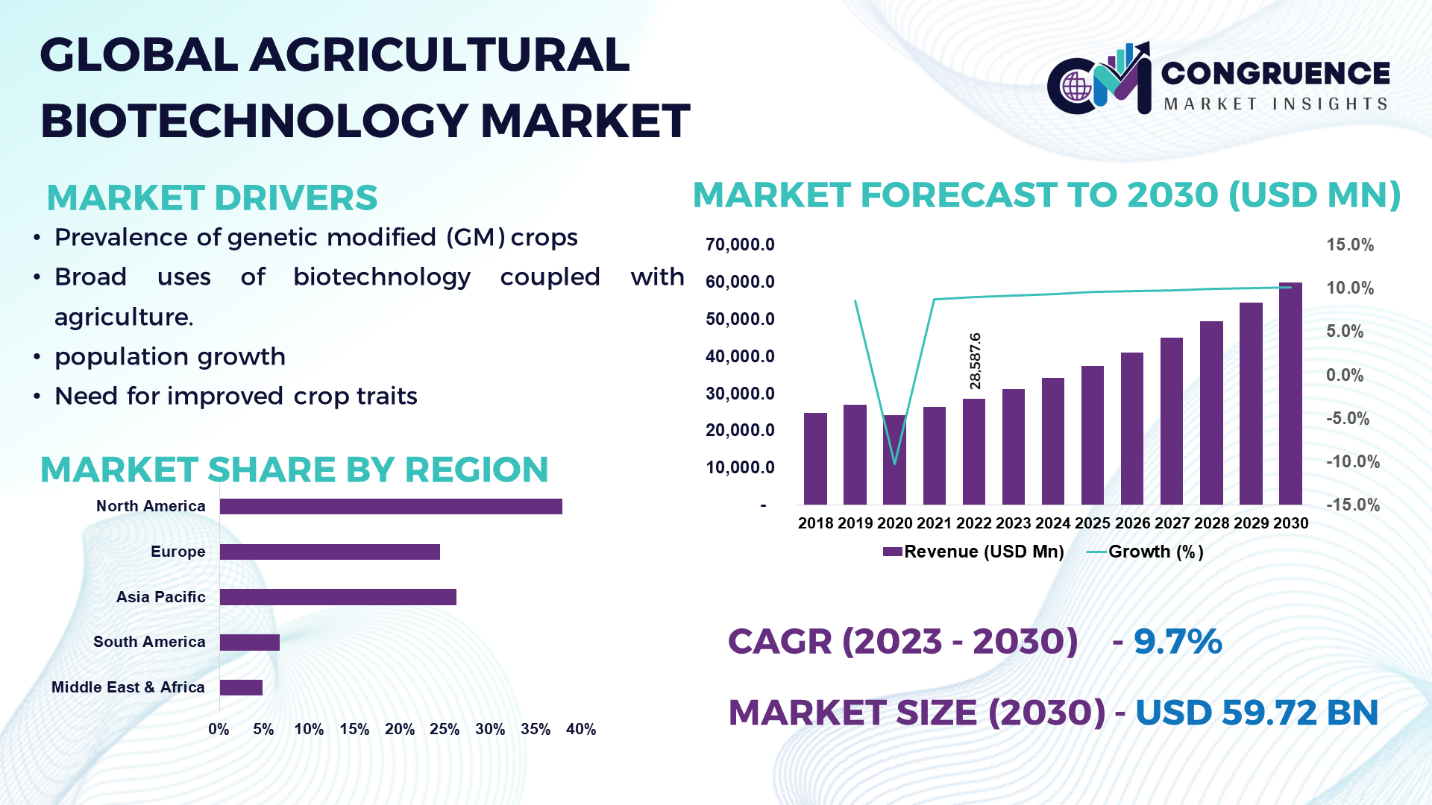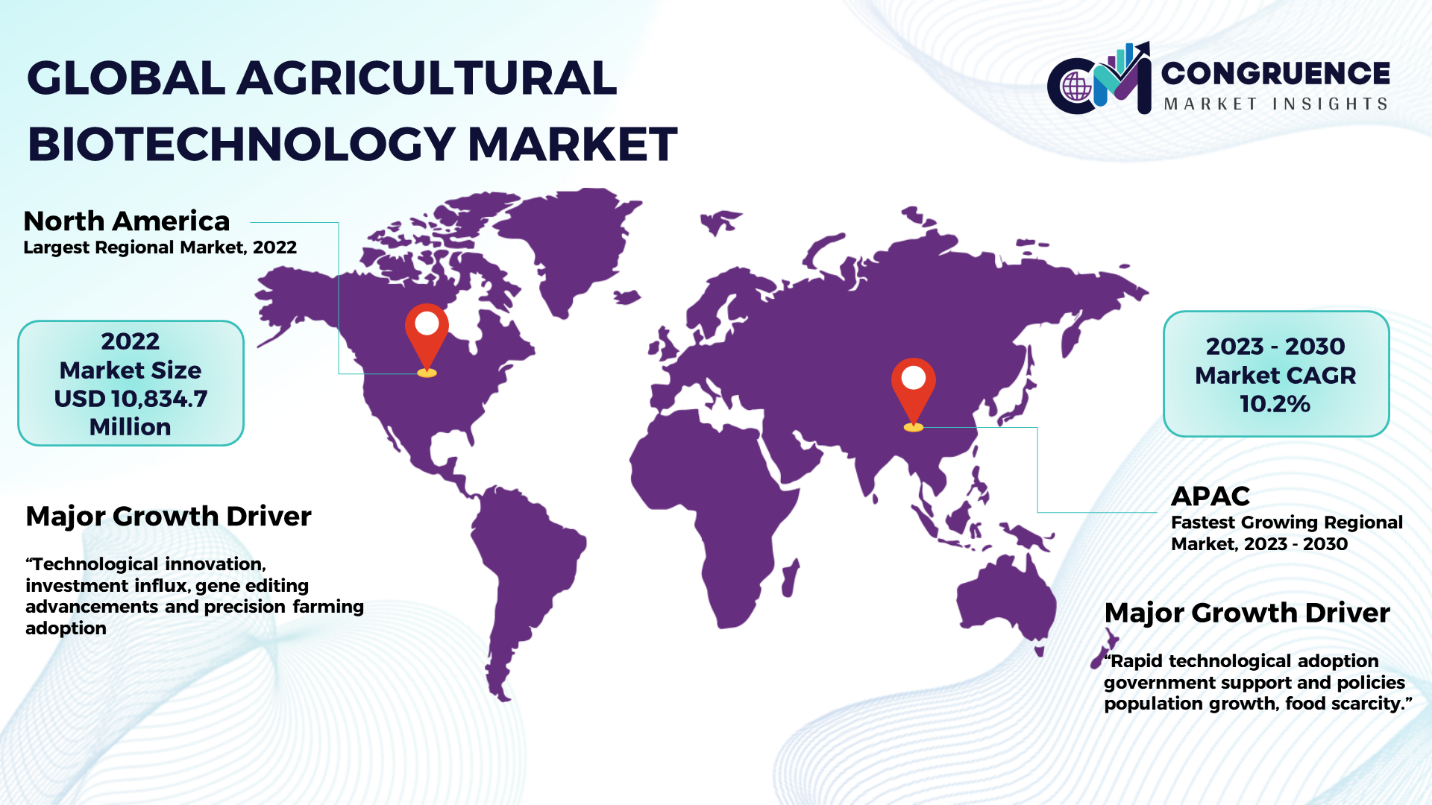Reports
The Global Agricultural Biotechnology Market was valued at USD 28,587.7 Million in 2022 and is anticipated to reach a value of USD 59,721.3 Million by 2030 expanding at a CAGR of 9.7% between 2023 and 2030.
Utilizing scientific techniques, biotechnology modifies and enhances microorganisms, plants, and animals to raise their nutritional content. Agricultural biotechnology is the name given to the area of biotechnology that deals with agricultural applications. Selection and breeding of agriculturally important organisms have long been the focus of agronomic biotechnology. For example, biotechnology has been utilized in agriculture to create animals that have traits such as faster growth and increased disease resistance. Plant tolerance to diseases and unfavorable environmental circumstances is mostly a result of agricultural biotechnology. Utilizing a wide range of contemporary methods, agricultural biotechnology produces novel goods with enhanced qualitative attributes. Conventional methods have been widely used to modify the genomes of plants and animals. Furthermore, genetic engineering breakthroughs have made it possible to regulate genetic alterations that are created in an organism. Additionally, during the projected period, the market's expansion will be bolstered by the growing cultivation of biotech plants with the assistance of agricultural biotechnology.

Agricultural Biotechnology Market Major Driving Forces
Prevalence of Genetic Modified (GM) Crops: Rising global adoption of genetically modified (GM) crops is anticipated to fuel market expansion. This is so that desirable features including high yield, high nutritional value, increased food-processing capabilities, and resistance to pests and diseases can be produced in food and feed crops by genetic modification. The need for agricultural biotechnology will probably boost market expansion as a result of all these variables.
Broad Uses of Biotechnology Coupled with Agriculture: The broad application of biotechnology combined with agriculture is expected to propel market expansion. Large-scale uses of agriculture-integrated biotechnology can be found in tissue culture, artificial insemination, embryo transfer, micropropagation, and cloning. Through the use of cutting-edge instruments, agriculture-integrated biotechnology has aided in the improvement of crops and livestock. Due to all these reasons, the market is growing faster.
Population Growth: Global population growth is driving the need for a massive expansion in food production. A promising solution is provided by agricultural biotechnology, which increases crop yields and lowers put up-harvest losses.
Need for Improved Crop Traits: The need for plants with enhanced characteristics, such as higher yield, pest and disease resistance, and stress tolerance, is rising. Genetic modification made possible by biotechnology allows for the advancement of these tendencies, which raises agricultural productivity.
Agricultural Biotechnology Market Key Opportunities
Adoption of Precision Agriculture: By combining biotechnology with precision farming methods, it is possible to maximize resource efficiency, increase crop yields, and boost total farm productivity. Thereby, creating a huge opportunity for the businesses to grow.
Creation of Biotech Characteristics for Developing Markets: Growing urbanization and population development in emerging regions offer agricultural biotechnology significant prospects. Creating biotech trends that are suited to those markets' particular requirements can help handle pressure from the food safety industry and the market boom.
Practices of Sustainable Agriculture: Precision farming, integrated pest management, conservation agriculture, and the adoption of sustainable agriculture practices are all on the rise. Agricultural biotechnology can support these methods by offering tools and solutions for practical resource-efficient, eco-friendly farming methods.
Agricultural Biotechnology Market Key Trends
· The agricultural biotechnology industry was dominated by genetically modified crops (GM) that have been engineered to have features notably tolerance to herbicides or resistance to diseases and pests.
· The development of CRISPR-Cas9 technology transformed agricultural gene editing by allowing for precise alterations to plant genomes.
· Increased interest in biotechnology solutions is a result of increased environmental sustainability consciousness.
· Precision farming technologies have been invented in large part due to agricultural biotechnology.
· In agriculture, the use of bioinformatics and data analytics has enabled improved decision-making procedures.
· Applications of synthetic biology in agriculture are becoming more popular.
Region-wise Market Insights
North America accounted for the largest market share at 37.9% in 2022 whereas, Asia Pacific is expected to register the fastest growth, expanding at a CAGR of 10.2% between 2023 and 2030.

Due to its diverse range of agro climatic zones, crops, and globally planted genetically modified (GM) land, North America dominated with the biggest revenue share. Together, the United States and Canada account for around half of the world's GM land and one-tenth of its planted land in this region. Corn, soybeans, and wheat are the main crops grown on North America's arable land; alfalfa, cotton, canola, and barley are the next most common crops. Furthermore, North America exports a net amount of agricultural goods, such as wheat, soybeans, and corn, to other countries. Asia Pacific, on the other hand, is anticipated to increase at the fastest rate. There are many diverse political and economic systems, cultural backgrounds, and linguistic groups present in this region, which makes it unique. Among them, the agriculture sector differs, with India using simple systems and Japan adopting strict technological requirements. Since the Asia Pacific region accounts for around 40% of the world's cultivated area, it is a profitable business. The importance of the rice crop and the preponderance of smallholders are two further characteristics of the region. All throughout Asia, rice is substantially subsidized, and in the majority of its developing economies, local governments place a significant priority on food security.
Segment-wise Market Analysis
· Based on application, the global agricultural biotechnology market is segmented into transgenic crops & animals, vaccine development, nutritional supplements, antibiotics development, biofuels, and flower culturing. Transgenic crops and animals is the segment with the biggest market share. Over the course of the forecast period, the segment focused on vaccine development is anticipated to experience the highest compound annual growth rate (CAGR).
· Based on organism type, the global agricultural biotechnology market is segmented into plants, animals, and microbes. Each of these segments can be further sub-segmented into three groups based on the techniques used, i.e. established genetic modification, traditional approaches, and innovative breeding techniques. The segment with the largest revenue share currently is plants. However, the animal segment is expected to increase at the highest compound annual growth rate (CAGR).
Market Competition Landscape
There are many producers in the worldwide agricultural biotechnology industry, and the level of competition is rising. Major businesses that have been producing greatest market share have their headquarters in the Americas and Asia-Pacific, which has made these regions developed markets for agricultural biotechnology. These businesses have also extended their distribution networks into numerous other areas. Additionally, there exist additional small- and medium-sized entities that derive income from regional marketplaces. This market has a large number of businesses operating worldwide. The majority of these participants are found in the Asia-Pacific and American regions. The market for agricultural biotechnology goods is dominated by a large number of medium-sized and small market participants, and as a result, their market shares differ significantly.
Prominent players in the market include:
· Monsanto (now part of Bayer)
· Syngenta (now owned by ChemChina)
· Corteva Agriscience
· Bayer CropScience
· Syngenta AG
· BASF Plant Science
· CRISPR Therapeutics
· Editas Medicine
· Syros Pharmaceuticals
· Novozymes
· KWS SAAT SE & Co. KGaA
· Precigen, Inc.
· Calyxt, Inc.
· Soylent Green
· Evogene Ltd.
· Tropic Biosciences
The agricultural biotechnology business is dominated by Bayer AG, a multinational pharmaceutical and life sciences firm. Through its subsidiary Monsanto, the company focuses on genetically modified crops such as herbicide-tolerant soybeans and insect-resistant corn. Major agricultural corporation Syngenta AG specializes in traits, seeds, and crop protection. It provides genetically modified seeds, innovations, and pest control solutions. After Dow Chemical Company and DuPont merged to form DowDuPont Inc., the company has emerged as a dominant force in the market, providing a broad range of genetically modified seeds, crop protection products, and agricultural technology. It also makes significant investments in R&D to increase crop productivity and sustainability.
|
Report Attribute/Metric |
Details |
|
Market Revenue in 2022 |
USD 28,587.7 Million |
|
Market Revenue in 2030 |
USD 59,721.3 Million |
|
CAGR (2023 – 2030) |
9.7% |
|
Base Year |
2022 |
|
Forecast Period |
2023 – 2030 |
|
Historical Data |
2018 to 2022 |
|
Forecast Unit |
Value (US$ Mn) |
|
Key Report Deliverable |
Revenue Forecast, Growth Trends, Market Dynamics, Segmental Overview, Regional and Country-wise Analysis, Competition Landscape |
|
Segments Covered |
· By Organism Type (Plants, Animals, Microbes) · By Type (Hybrid Seeds, Transgenic Crops, Bio-pesticides, Bio-fertilizers) · By Technology (Genetic Engineering, Tissue Culture, Embryo Rescue, Somatic Hybridization, Molecular Diagnostics) · By Application (Vaccine Development, Transgenic Crops & Animals, Antibiotic Development, Nutritional Supplements, Flower Culturing, Biofuels) |
|
Geographies Covered |
North America: U.S., Canada and Mexico Europe: Germany, France, U.K., Italy, Spain, and Rest of Europe Asia Pacific: China, India, Japan, South Korea, Southeast Asia, and Rest of Asia Pacific South America: Brazil, Argentina, and Rest of Latin America Middle East & Africa: GCC Countries, South Africa, and Rest of Middle East & Africa |
|
Key Players Analyzed |
Monsanto (now part of Bayer), Syngenta (now owned by ChemChina), Corteva Agriscience, Bayer CropScience, Syngenta AG, BASF Plant Science, CRISPR Therapeutics, Editas Medicine, Syros Pharmaceuticals, Novozymes, KWS SAAT SE & Co. KGaA, Precigen, Inc., Calyxt, Inc., Soylent Green, Evogene Ltd., Tropic Biosciences. |
|
Customization & Pricing |
Available on Request (10% Customization is Free) |
